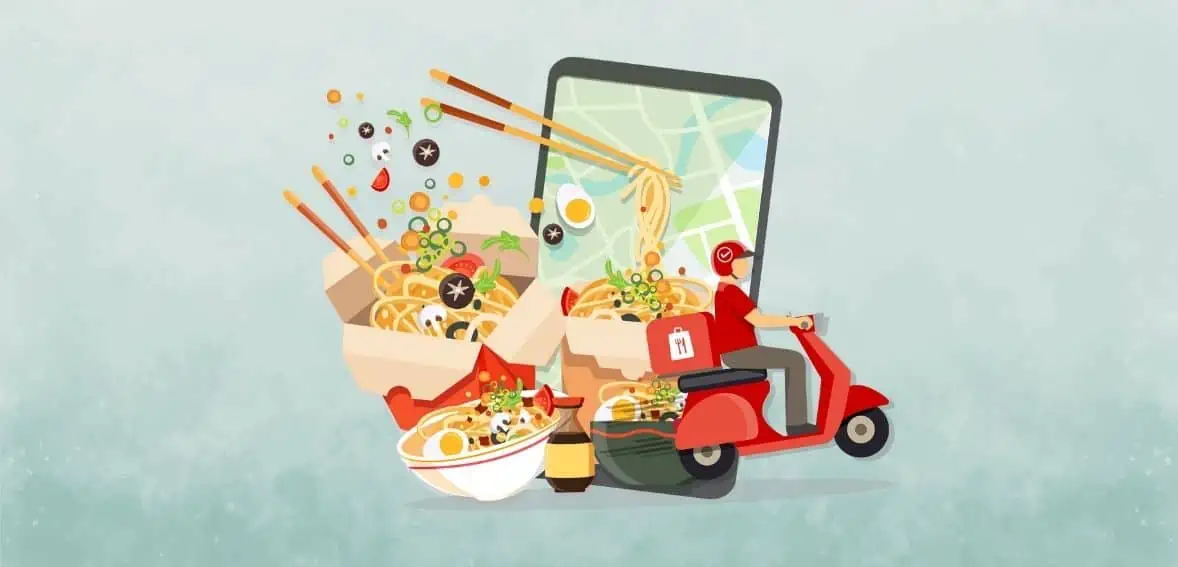Food delivery apps have become an important part of the food experience as of 2024. While we continue to enjoy eating out, ‘eating in’ has become an equally enjoyable trend. Online apps, especially third-party food delivery services, have made ordering food online easier. Even 20 years ago, having food from your favorite restaurants delivered to your doorstep would have sounded like a distant dream to most.
Delivery services for restaurants act as a connection between the eatery and its customers. The customer orders food on the respective delivery app, their restaurant of choice prepares the food, and the delivery person from the service comes to pick it up. The food is then delivered to the customer, completing a three-point chain.
What Is Third-Party Food Delivery?
3rd-party delivery services are platforms that make it easier for customers to order and receive goods or services from businesses. They serve as middlemen through user-friendly applications or websites, bringing together customers and local eateries, grocery stores, or retailers. Some famous examples of 3rd party delivery services include:
- DoorDash
- Uber Eats
- Grubhub
- Instacart
- Drizly
Users order online, make payments, and browse menus while the third-party service handles delivery logistics. Businesses like restaurants and other merchant stores use it to deliver customer items. Third-party delivery services are important in the current on-demand economy since they help businesses grow their customer base while providing accessibility and convenience.
Which Company Is Best for Food Delivery?

With so many options available to pick from, choosing one of the best food delivery companies for your business can be tricky. Let’s go over the best ones and weigh your options in detail.
1. DoorDash
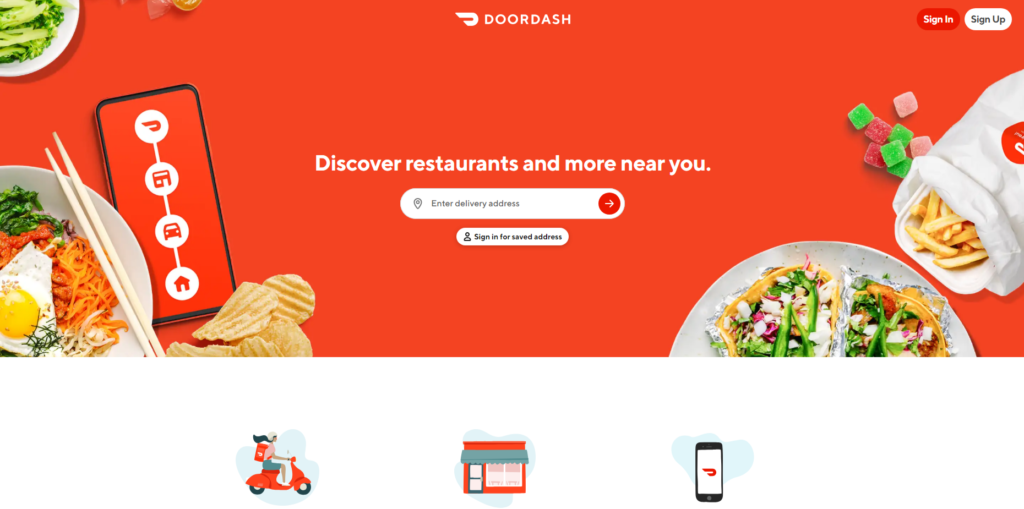
Image source
Easily the most popular food delivery app in the US, DoorDash offers you the best market access. Working with large chain restaurants and small businesses alike, DoorDash boasts strong and widespread ties in the market. Most importantly, DoorDash offers the best app marketplace. The company’s popularity and widespread operations together help businesses gain a lot of exposure.
Pros:
- With DoorDash, businesses can enjoy multiple delivery options such as self-delivery, pickup, and white-label deliveries.
- DoorDash is compatible with numerous POS solutions, granting you more flexibility.
- For orders placed using the DoorDash app, there are no credit card processing fees.
- This company is perfect for a variety of businesses.
- DoorDash boasts the best online food delivery marketplace.
Cons:
- The on-demand delivery for DoorDash can be pretty costly.
What Kind Of Businesses Should Choose DoorDash?
Whether you own a restaurant, liquor store, or retail/convenience store, you can potentially partner with Doordash. This third-party delivery service is an ideal choice for your business if you:
- Seek more exposure and access to a larger market through the DoorDash marketplace.
- Would prefer if your customers didn’t have to pay any additional processing charges for credit card payments.
- Want to be able to get the POS integration of your choice.
2. Uber Eats

Image source
Next up on the list, we have Uber Eats, which happens to be the second most popular food delivery app in the country. Uber’s established ride-sharing service has already helped the company build a vast network. Businesses partnering with Uber Eats get to enjoy access to this network, including potential customers using the ridesharing service.
Pros:
- Uber Eats comes with the perks of a globally recognized brand, and collaborating businesses get to reap the benefits.
- There are no payment processing fees for orders placed via the app.
- The company offers self-delivery, pickup, and white-label delivery options.
- You get to enjoy access to a vast network of users.
- The interface is quite simple and easy to use.
Cons:
- Uber Eats charges higher fees for self-deliveries.
What Kind Of Businesses Should Choose Uber Eats?
Uber Eats offers delivery services for restaurants, grocery stores, convenience stores, pet stores, liquor stores, and other businesses. Following the company’s collaboration with NimbleRx, it also delivers prescription medicines. Uber Eats is an ideal option in the following scenarios.
- A restaurant needs the advantage of a recognized brand name alongside widespread market access.
- You’d rather not pay any processing fees for app orders.
- A business sells a range of products, not limited to food.
- Business owners trying to avoid having to pay processing fees for app orders.
3. Grubhub
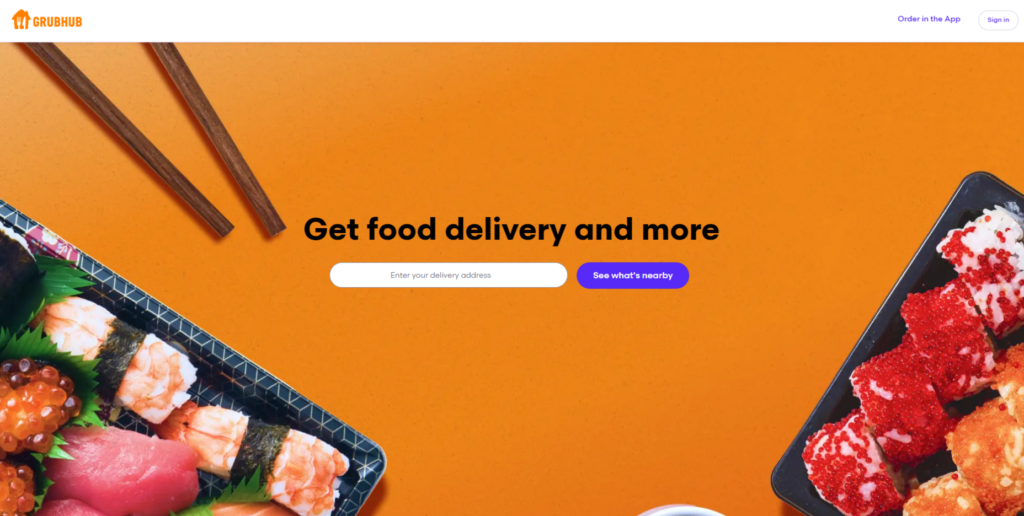
Image source
Present in almost all the major cities in the US, Grubhub is yet another major company providing 3rd-party delivery services. The company offers several top-notch marketing features, which allow it to be a preferred choice for businesses trying to stand out from the rest. In addition to free menu photoshoots and consultation, businesses partnering with the company also receive Grubhub tablets for free.
Pros:
- Grubhub can significantly bolster your marketing efforts.
- You don’t have to pay for the Grubhub tablet, menu photoshoots, and menu consultations.
- The higher plan levels offer various loyalty perks and promotions.
- Pickup, self-delivery, and white label – all three options are available.
Cons:
- Grubhub can be relatively expensive for businesses
- The processing fees are passed on to merchants.
What Kind Of Businesses Should Choose Uber Eats?
Unsure whether Grubhub is the right choice for your business? It certainly might be, if:
- You’re okay with paying the processing fees for your customers.
- Some additional assistance with marketing is necessary for your business.
- You wish to enjoy the free features offered by the company.
- You don’t mind the relatively higher expenses.
Apart from restaurants, Grubhub is also a suitable delivery partner for liquor stores and convenience stores.
4. Instacart
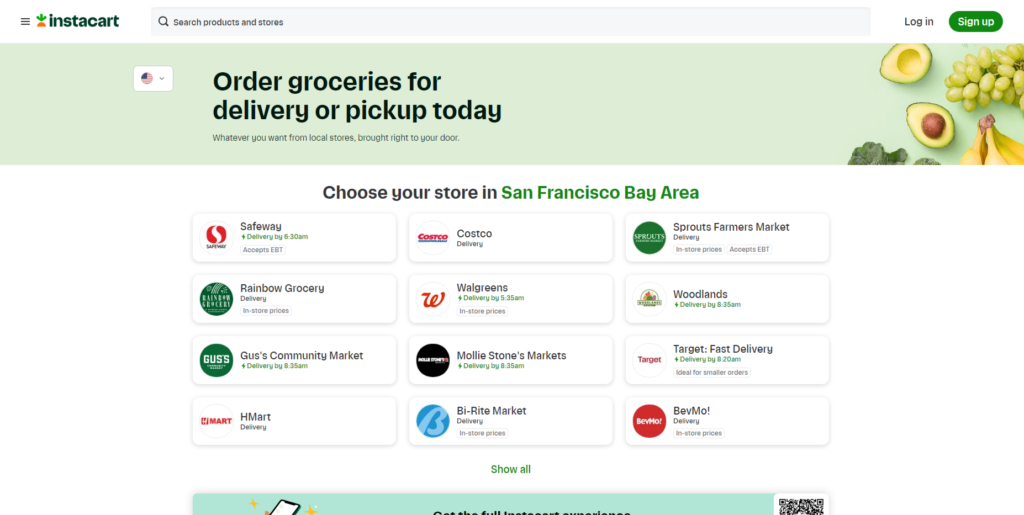
Image source
Indeed, DoorDash, Grubhub, and Uber Eats are the top choices for restaurants. Instacart, however, takes the crown when it comes to grocery deliveries. While you can still use the others for grocery deliveries, Instacart is relatively more hassle-free. This is because business owners aren’t required to do much to conduct business via Instacart. The company’s personal shoppers gather all the items from the respective stores themselves. Your business might already be on the platform even without you signing up for it.
Pros
- Your business can generate significantly more sales by accessing a large online customer base.
- Business owners can enjoy a relatively laid-back experience since the process is handled mostly by Instacart and its personal shoppers.
- Both curbside pickup and delivery options are available on Instacart.
Cons:
- Registering your business on Instacart can potentially cause a drop in sales on your own internal online platform.
- Instacart doesn’t disclose the pricing for stores online.
What Kind Of Businesses Should Choose Instacart?
Groceries are the primary focus of Instacart, but the company also offers alcohol and other retail deliveries. It’s a smart choice for businesses that:
- Would like to benefit from the company’s online customer base
- Are more focused on groceries and other retail items
- Don’t want to put much effort into marketing.
5. Drizly
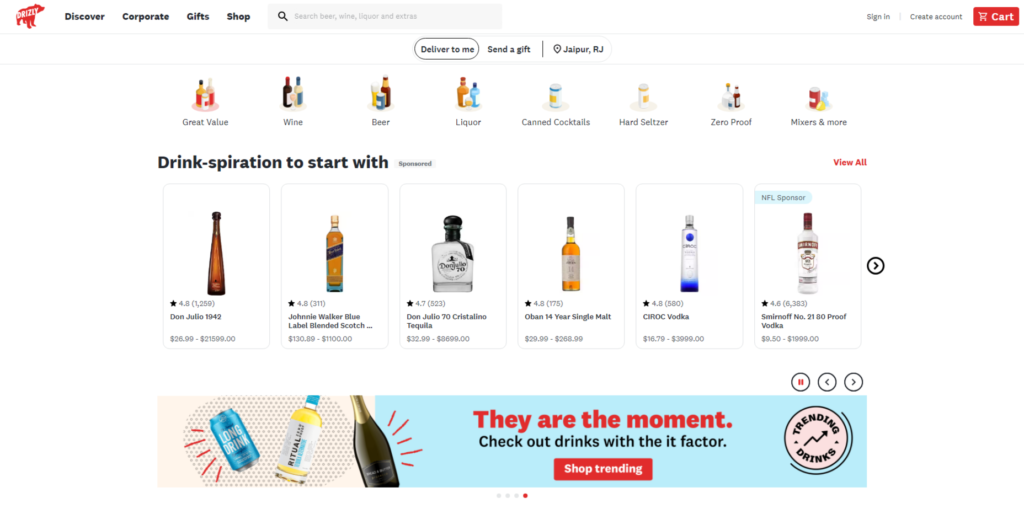
Image source
Now, liquor store owners would find Drizly to be the most logical choice for third-party deliveries. Unlike the others in this list, which may or may not deliver alcohol, Drizly is exclusively an alcohol delivery service. With superb reporting features, superb POS integration, and other perks, Drizly has a lot to offer.
Pros:
- Uber One members get to enjoy free deliveries.
- Drizly offers dedicated account managers, as well as staff training.
- POS integration is never an issue with Drizly.
- Reporting issues is pretty easy and effective.
Cons:
- Drizly doesn’t offer delivery services in all states. Depending on the location, businesses might have to hire their own delivery drivers.
- The company doesn’t reveal the pricing for stores online.
What Kind Of Businesses Should Choose Drizly?
As it’s obvious already, Drizly is the best provider of 3rd-party delivery services for liquor shops. Partnering with this company might be a good idea if:
- You are in need of a dedicated account manager who would also train the staff.
- Your business requires an app that complies with both local and state laws and regulations regarding the sale of alcohol.
- Hiring delivery drivers directly isn’t a problem.
7 Reasons Why Working With Third-party Delivery Companies Is A Good Idea

So, what led to the widespread adoption of third-party delivery services? Considering the perks, it’s pretty obvious that businesses would want to partner with these companies.
1. Low Overhead Costs
For small businesses that have limited resources, managing a delivery team and vehicle fleet is near-impossible. Leveraging delivery services for restaurants allows a business to avoid the costs associated with:
- Acquiring delivery vehicles
- Maintaining the vehicles
- Hiring delivery workers
- Training and managing the delivery team
By leveraging the delivery infrastructure and manpower of a third-party food delivery service provider, businesses can curtail overhead costs significantly.
2. Quick Entry Into The Market
Entering the delivery market can be quite a challenge for new businesses, owing to the high level of competition in recent times. The time it takes a business to set up its own delivery infrastructure from scratch poses a challenge too. Thankfully, the best food delivery companies in your region can help your business enter the market immediately.
3. Scalability
Entering the market alone isn’t enough – a business should also be able to scale its delivery infrastructure as needed. Failing to scale up during high demand would result in a less-than-ideal experience for customers due to a shortage of delivery workers and vehicles. On the other hand, an unnecessarily large delivery team would only incur avoidable expenses. Roping in the top third-party food delivery services enables your business to scale up and scale down seamlessly with the demand.
4. Flexibility
This goes hand-in-hand with the scalability advantage. Several third-party food delivery service providers allow businesses to choose from multiple services and commission tiers. This way, businesses have the flexibility to enjoy services that meet their requirements and suit their budget the best.
5. Enhanced Reach
This is one of the biggest reasons to partner with a third-party company for deliveries. Even for popular restaurants and other F&B establishments, dedicated web portals and apps are nowhere close to third-party marketplaces in terms of popularity. Getting your business on such platforms also grants a significant boost in exposure, allowing you to acquire new customers.
6. Helpful Insights
The top-rated third-party food delivery companies also share a variety of insightful data with businesses using their services. A business can then customize its offerings and tailor its marketing strategy based on this consumer data, ultimately achieving greater success.
7. Increased Efficiency
It’s worth noting that deliveries are the specialization of companies offering third-party food delivery services – not F&B businesses. Their experience, infrastructure, and resources enable them to do the job more efficiently than most businesses that handle their deliveries. Alongside keeping the customers satisfied, this also helps bring down the costs.
Potential Pitfalls Of Third-party Food Delivery Services
Third-party food delivery services admittedly come with a host of benefits. However, they are not entirely without drawbacks. Before collaborating with one of these companies, consider the potential pitfalls.
1. Dilution Of Brand Value
Putting your business alongside hundreds or thousands of other businesses on an online platform dilutes its brand value. Remember, a third-party food delivery company would be promoting other businesses just as much as it promotes yours. This would make it harder for your business to stand out from the rest. Instead of developing loyalty towards your business, your customers might grow loyal to the delivery platform.
2. Lost Control Over Customer Experience
Allowing a third-party company to handle the deliveries reduces a business’ control over the experience of its customers from the moment the food is handed over to a delivery worker. Any mistakes by the delivery worker or the service provider can potentially tarnish the restaurant’s reputation and even cause it to lose customers.
3. Added Costs
While the delivery service providers do help businesses make significant savings, the commission costs can eat into the profits. With restaurant prices on the rise, passing on the delivery costs to customers continues to become increasingly difficult. When partnering with multiple platforms, managing all the orders might require additional manpower and/or software, adding to the complexity and the costs.
Is It Worth Partnering With A Third-Party Food Delivery Company?
Thankfully, the benefits of having a third-party service provider take care of your deliveries by far surpass the drawbacks. Especially for small and medium-sized businesses, it’s much more profitable to simply work with an external delivery company. The vast market access and exposure alone make it worth getting your business registered on these platforms.
As for the pitfalls, they can mostly be mitigated. Choosing to partner with the most reliable delivery service providers significantly reduces the chances of mishaps and errors that might hinder the customer experience. While such situations can’t be avoided completely, the top-rated delivery platforms typically offer refunds or other forms of compensation to appease customers.
The sales generated through the significantly increased exposure should make up for the commissions and other added costs associated with third-party deliveries. Ultimately, letting a third-party service provider handle your deliveries is hands down the best solution.
How To Choose The Best Third-party Food Delivery Service For Your Business?
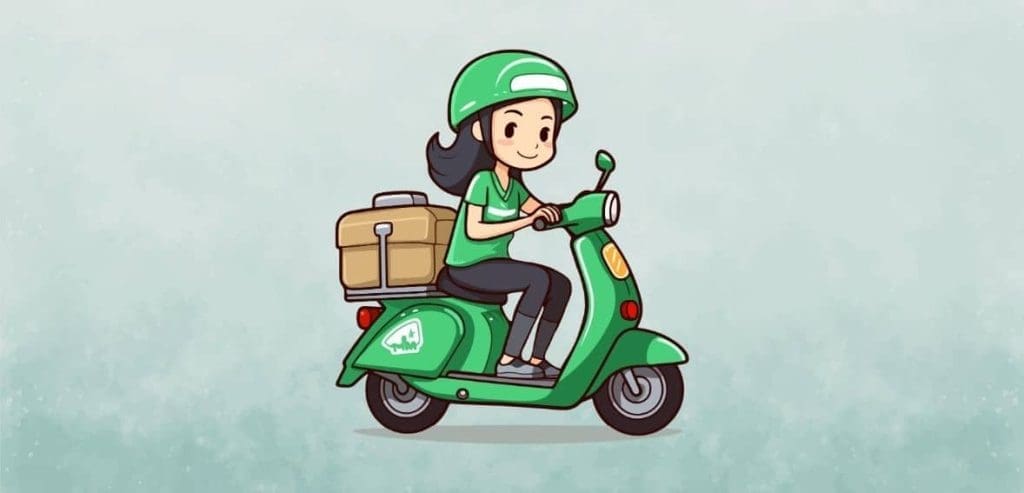
Partnering with all the top-rated 3rd-party food delivery services might not be viable or practical for your business. This is when you need to carefully asses your options and pick the one that works the best. Here are X factors to consider before choosing a delivery service.
1. Cost Structure And Pricing
Explore the cost structure and pricing plans of different services to see which one fits your budget and helps you maintain your profit margins the best. While some companies charge a flat fee on every delivery, others follow a scaling approach and deduct a specific percentage of the total order value.
2. POS And Other System Integrations
Technology integration is a crucial aspect to consider while choosing a delivery platform. Make sure that the platform of your choice integrates seamlessly with your inventory management system, POS, and other systems. Compatibility issues can cause severe hindrances for businesses, potentially resulting in financial losses due to delays and downtime.
3. Deal-breakers And Flexibility
Next, think about the deal-breakers and consider how much flexibility you can allow for different aspects. From order tracking to proof of delivery, there are plenty of features that may or may not be covered by a company. List your criteria in terms of priority and shortlist your options accordingly.
4. Speed And Reliability
Remember, the timeliness of your chosen delivery partner will have a direct impact on the experience of your customers. Partnering with a delivery platform known for quick deliveries is essential. While customers buying groceries might be okay with waiting for longer, those ordering food from restaurants would want the delivery to ideally take 30 minutes or less.
5. Geographic Limitations
Pay attention to the geographic limitations of the delivery platforms you’re considering. In this regard, also consider which third-party food delivery company would be best for the region your business is located in. Research the market trends thoroughly to identify the most popular and efficient delivery platform in your region.
Conclusion – Choose The Best Third-party Delivery Company For Your Business
There’s no one-size-fits-all solution when it comes to finding a delivery platform. The same delivery partner that works perfectly for a business next door might not be ideal for yours. Every business owner should weigh the options carefully before making a decision.
From integrating your digital systems with your delivery platform to choosing the most cost-effective plan, there are plenty of things to consider. However, now that you have a detailed overview of the top-rated third-party delivery services and the factors that matter, finding the best solution for your business should be easier.

